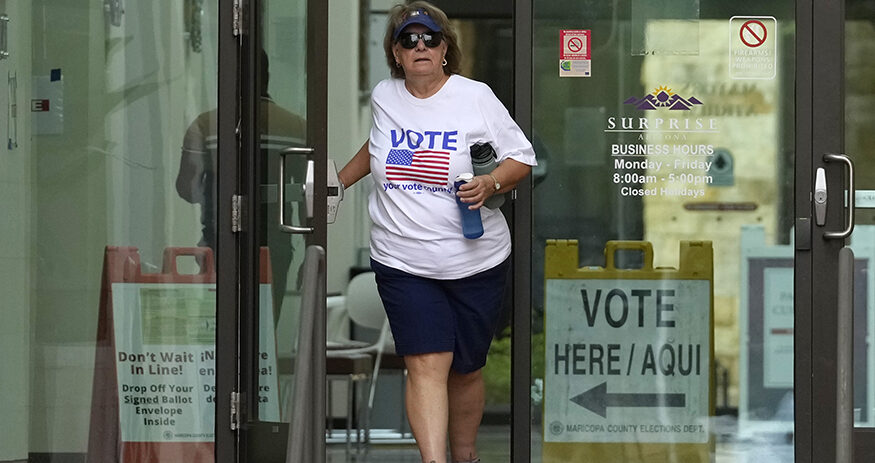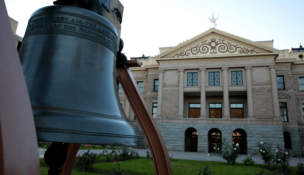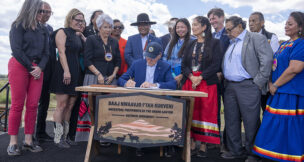Arizona county recorders won’t have to check citizenship of federal-only voters, court rules
Howard Fischer, Capitol Media Services//October 13, 2024//[read_meter]
Arizona county recorders won’t have to check citizenship of federal-only voters, court rules
Howard Fischer, Capitol Media Services//October 13, 2024//[read_meter]
A federal judge has slapped down a bid by an Arizona group to force county recorders to immediately investigate whether more than 40,000 registered voters are citizens.
In a 22-page order, Judge Krissa Lanham, a 2024 nominee of President Joe Biden, said Strong Communities Foundation of Arizona lacks standing to challenge what the group claims is the failure of county officials to run citizenship checks on those who have signed up to vote only in federal elections. The judge said the group has failed to show any harm that would occur if she did not issue such an order.

Lanham said the same is true for Yvonne Cahill, a Republican Party member, who also joined in the lawsuit. The judge rejected any claim that Cahill, a naturalized citizen, would have her vote diluted if it turns out any of these federal-only voters are not citizens.
But the judge said there’s an even bigger problem: timeliness.
She said that the lawsuit is based, at least in part, on what challengers contend is the refusal of all 15 county recorders to follow a 2022 state law requiring them to send inquiries to various federal agencies to check the citizenship status of those federal-only voters.
“Plaintiffs waited until shortly before the election to file this lawsuit despite allegedly suffering irreparable harm since Arizona’s 2022 voter list maintenance laws went into effect,” Lanham wrote. What’s worse, she ruled, is they are asking her to order counties to do this work in the middle of an already ongoing election: The claim was filed just 24 days before early voting began this past Wednesday. That, said the judge, is not acceptable.
Merissa Hamilton of Strong Communities said the group’s attorneys are evaluating the ruling.
At the heart of the lawsuit is Arizona’s two-tiered voter registration system.
Those who provide documented proof of citizenship, required under a 2004 voter-approved law, are entitled to vote in all elections.
But the National Voter Registration Act says individuals without such proof can sign up to vote in federal elections, president and members of Congress, simply by signing an avowal, under penalty of perjury, that they are citizens and otherwise qualified to cast a ballot. At last count there were about 42,000 on that list.
Still, the law does make it illegal for noncitizens to vote.
The lawsuit alleges that county recorders are obliged under both state and federal statutes to perform “list maintenance” on their voter rolls. More to the point, the challengers contend the recorders are not complying with that law.
So they sued to get an order for the recorders to make what they claim are mandatory checks. And they also want the recorders to turn over a list of all those who registered without providing proof of citizenship, which is legal, to Attorney General Kris Mayes.
In filing suit, the challengers provided nothing to suggest that people who are not citizens actually are signing up to vote in Arizona, much less they are casting ballots.
Instead, it cited information about efforts in other states where election officials said they had purged foreign voters from the rolls, including situations some actually had voted. And, based on that, the challengers argued that if the recorders checked with federal databases they would discover some of the registrants, particularly those who signed up in recent months, are ineligible to vote.
Lanham was unimpressed.
“Plaintiffs do not provide any plausible factual allegations supporting this belief,” she wrote. “Moreover, their claims about the likely results of the investigation rely on a public opinion poll.”
That refers to a survey conducted for America First Legal in Arizona and five other battleground states conducted by Rasmussen Reports, which claims that more than 1% of those who said they were likely voters actually admitted to not being citizens.
Aaron Thacker, press aide to Secretary of State Adrian Fontes, said there is little basis to believe that there are many people who have signed up to vote and signed a sworn statement under penalty of perjury who are not actually allowed to cast a ballot.
“The federal only ballots are made up of groups like Native Americans, college students and the elderly,” Thacker said, those who may not have easy access to the documents to prove citizenship.
Lanham said there’s another problem with the lawsuit.
That’s also the assessment of Pima County Recorder Gabriella Cazares-Kelly, who wrote to attorneys from Strong Communities when they first threatened to sue her.
“Reality has proven that as a general rule, those who are not citizens do not register to vote.” Cazares-Kelly said. “In rare cases where someone who is not eligible actually attempts to register to vote, there are safeguards and laws to ensure that only eligible persons can vote.”
As originally filed, the challengers demanded that the recorders take immediate action to actually cancel the registrations of those whom they cannot get proof of citizenship from the registration rolls.
The only thing is, the judge noted, federal law pretty much precludes making such moves within 90 days of an election. So the lawsuit was altered to ask only that the counties send the citizenship inquiries to the federal agencies to start the investigation.
In doing that, however, Lanham said they undermined their claim that an immediate court order was needed to ensure that non-citizens did not dilute the votes of others: If the rolls can’t be altered now, the challengers can’t get the legal relief they seek.
But the judge said even a stripped-down approach requiring recorders to start making inquiries with federal databases of all these federal voters is legally problematic coming so close to an election.
She said that the same 90-day rule that precludes registration cancellation also is designed to prevent eleventh-hour administrative burdens for elected officials.
“Running statewide elections is extraordinarily complicated and difficult, poses significant logistical challenges, and requires enormous advance preparation by state and local officials,” Lanham wrote. And the judge said the challengers presented nothing of merit to show that those officials should be forced to divert resources earmarked to run an election to instead start inquiring to federal agencies about citizenship status.














